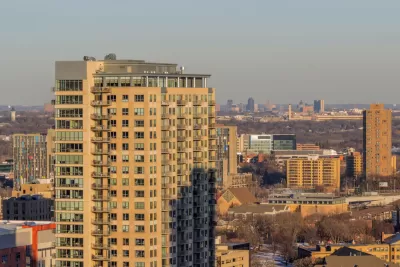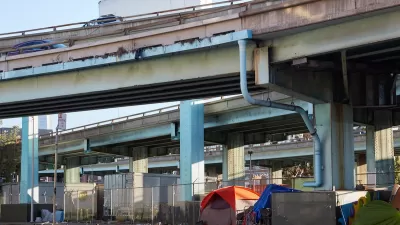Housing advocates say the additional resources made possible by federal relief funds offer a useful model for improving conditions for unhoused people.

“For a brief moment in time, funding materialized that cured long-intractable problems like reducing child poverty, funding unemployment at a dignified level and functionally ending homelessness in cities like St. Paul,” writes Bill Lindeke in MinnPost. But now, “The money has run out, and policymakers and shelter providers are facing the grim prospect of going back to the less humane way that our society treated people before COVID.”
Sarah Liegl, the director of the St. Paul’s Project Home, praises the benefits of single-room occupancy (SRO) housing that became possible during the pandemic. “The influx of money taught us there’s a much better way. It’s amazing. Families can come in and have their own room and lock their door, and we’ve seen a huge increase in the number of families finding housing.”
As federal funding dries up, the model looks less sustainable. “Without help, it leaves a bleak outlook for shelters focused on individuals, like the former Bethesda Hospital site in the Capitol Heights neighborhood,” Lindeke writes.
Advocates are hopeful that the success of pandemic-era programs will convince state legislators to allocate more funding to programs that support SRO shelters. “It might be the first sign of possible change in a field that’s long been seen as an almost Sisyphean struggle against an inevitably victorious foe.” As Lindeke points out, “The U.S. government just proved that it can fix long-standing social ills, and the hope is that a large state surplus can keep the county’s unsheltered families in their stable homes.”
FULL STORY: ‘There’s a much better way’: How pandemic relief offered a roadmap for addressing homelessness

Trump Administration Could Effectively End Housing Voucher Program
Federal officials are eyeing major cuts to the Section 8 program that helps millions of low-income households pay rent.

Planetizen Federal Action Tracker
A weekly monitor of how Trump’s orders and actions are impacting planners and planning in America.

Ken Jennings Launches Transit Web Series
The Jeopardy champ wants you to ride public transit.

Driving Equity and Clean Air: California Invests in Greener School Transportation
California has awarded $500 million to fund 1,000 zero-emission school buses and chargers for educational agencies as part of its effort to reduce pollution, improve student health, and accelerate the transition to clean transportation.

Congress Moves to End Reconnecting Communities and Related Grants
The House Transportation and Infrastructure Committee moved to rescind funding for the Neighborhood Equity and Access program, which funds highway removals, freeway caps, transit projects, pedestrian infrastructure, and more.

From Throughway to Public Space: Taking Back the American Street
How the Covid-19 pandemic taught us new ways to reclaim city streets from cars.
Urban Design for Planners 1: Software Tools
This six-course series explores essential urban design concepts using open source software and equips planners with the tools they need to participate fully in the urban design process.
Planning for Universal Design
Learn the tools for implementing Universal Design in planning regulations.
Heyer Gruel & Associates PA
Ada County Highway District
Institute for Housing and Urban Development Studies (IHS)
City of Grandview
Harvard GSD Executive Education
Toledo-Lucas County Plan Commissions
Salt Lake City
NYU Wagner Graduate School of Public Service





























